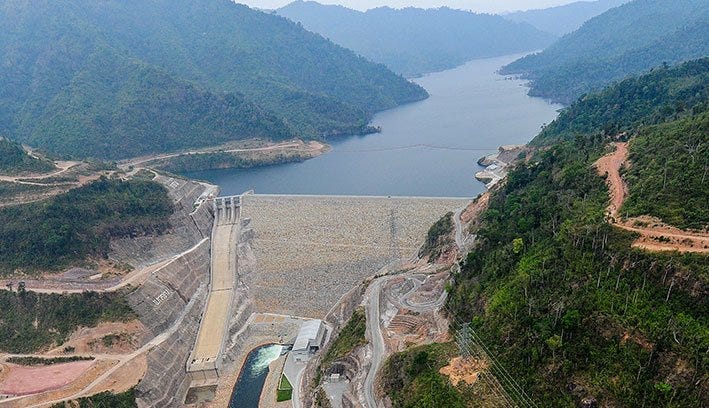Thai ‘renewables’ Power Producer CKPower Targets Net Zero Emissions by 2050
(Nam Ngum 2 Hydroelectric Power Plant)
CKPower, one of Southeast Asia’s largest producers of renewables-based electricity, has set a goal to reach net zero emissions of greenhouse gases across its electricity generation plants by 2050.
Thanawat Trivisvavet, Managing Director of CKPower, said: “We have adopted this challenging goal to reduce our absolute emissions of greenhouse gases by 100%. It’s a decision we have made in consideration of the 26th United Nations Climate Change Conference (COP26), and to support Thailand’s national policy to rapidly increase renewables-based electricity generation for both domestic as well as industrial use.”
He added that CKPower already has one of the lowest carbon footprints of all major electricity producers in the region, and that he intended for CKPower to stay at the forefront by adopting the Net Zero Emissions goals.
CKPower has recently been designated a ‘Climate Action Leading Organization’ by the ‘Thailand Carbon Neutral Network’.
Two cogeneration power plants in which CKPower has invested, and which are operated by Bangpa-in Cogeneration Company Limited, have also just received certification by the Thailand Greenhouse Gas Management Organisation for successfully meeting the requirements of the Carbon Footprint Label Scheme.
The Thailand Greenhouse Gas Management Organisation, an autonomous governmental organization under Thailand’s Ministry of Natural Resources and Environment, is responsible for supporting and monitoring the reduction of greenhouse gas emissions in Thailand and implements a total lifecycle analysis of greenhouse gas emissions.
CK Power is also increasing the share of electricity it produces from renewables to be 95% of its total capacity, up from the current 89%. The company plans to more than double in size in the next three years and add around 2,800 megawatts of electricity-generating capacity, on top of its current total installed capacity of 2,167 MW across 13 power plants. All of the new installed capacity is to be based on renewables, including solar, wind, and water.
The demand for energy in ASEAN is expected to double in the next 20 years, and the share of renewables-based electricity generation is forecast at around 20% of total electricity generation.
By the end of the next decade, the transport sector is forecast to become the largest consumer of energy in ASEAN, even ahead of the industrial sector. Thailand has set a goal to have 30% of all new cars to be electric within 2030.
#CKPower #Thailand #NetZero





